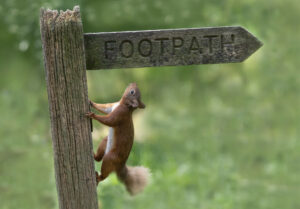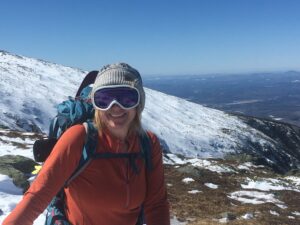Posts by Liz Michalski
I’ve started and stopped this essay a half dozen times. I’ve despaired. About so many things. The world. The country. Humanity. My loved ones. And down at the bottom of the list, my ability to ever write a coherent and moving sentence again. Besides, even if I could, what would it matter? It won’t change what’s done, won’t set the world right, probably won’t change a single mind or heart.
We were hit with a snowstorm where I live this week, and when it was over I went out in freezing temperatures and stomped around on snowshoes for a few hours, battling the cold and the ice and the way my left snowshoe always comes undone at the most inconvenient time, and when I’d finished, and I had no feeling left in my fingers and toes, I thought to myself Why did I do that? It was pointless and hard and didn’t change anything. What a waste of time. But then I thought some more. About the way my cheeks were glowing, how it had felt to not see another person for all that time, only trees and a swathe of unbroken white, the way my muscles were pleasantly tired and I thought I might be able to sleep later. And I realized
I did it because it brought me joy.
And sometimes, that is enough. It’s not everything, but it’s enough.
Later that night I dug out an old notebook and wrote down everything I remembered about the hike. The red berries against the white snow. The brightly painted birdhouse with its door propped open to keep the mice from sheltering there. The coyote tracks, large and in a straight line, heading to the part of the stream that wasn’t frozen. I captured it all, word by careful word.
Those words, like the hike, didn’t change anything either. But they brought me joy as well, and rereading them here, I can feel my heartbeat slow a bit. I can smell the crisp, fresh air and see the dark trees swaying in the wind at the edge of the field. Maybe you can too.
Maybe it brings you joy.
Maybe it doesn’t always have to be our best work. Maybe, as writers, it just has to be enough.
Now it’s your turn. How is your writing going these days? Where are you finding joy?
Read MoreThis past summer I was lucky enough to hike a portion of the Southwest Coast Path in Cornwall, England. Because the dates of my trip changed several times and it wound up being pulled together at the last minute, I did something I’ve never done before: I hired a guide to help me plan it. Her expertise was invaluable – she set up stays at local inns, recommended places to eat, shared daily weather updates, and checked in at the end of each day to make sure I’d made it.
After the trip was over, she requested a zoom call to debrief, and asked whether there was anything I would have done differently. The only thing I could think of was that I wished we’d built in time to see or even attend a show at the Minack Theatre. Carved into rugged stone and perched on a cliff over the water, it is breathtakingly beautiful with madly good acoustics. It was directly on my path, and I’d counted on being able to ramble about the grounds since it was the off season, but there was a production going on that afternoon so the theatre was closed to those not attending. I could have purchased a ticket, but that meant I would still be on the path when it was getting dark, and with hundred-foot drops into the ocean on one side, it wasn’t a scenario I was comfortable with. So with regret I picked up my pack and continued walking, listening as the music from the theatre filled the air for the next half mile.
I shared this with my guide, who was quiet for a moment. “Well,” she said at last. “Sometimes you have to choose. You can be a pilgrim or a tourist, but not both.”
I’ve been turning her statement over in my head ever since, asking which I am in each situation I encounter. Not because it will change what I do, necessarily, but because it allows me to recognize what is important to me, which helps me set priorities.
There’s no shame in either category. Not everything we do is going to call to our soul and ask for a deeper investment of time and energy. And that’s ok.
I’m a tourist, for example, when it comes to my interest in watercolors. A surface level knowledge and understanding is plenty for me at this time, and I’m quick to move on to other activities especially when what I am doing becomes difficult. If the end result of my attempt to paint a bunny looks more like a mutant ninja turtle, I’m mostly okay with that.
But as a hiker, I am a pilgrim. I take delight in the rhythm of the walk, the concentration and endurance it requires to put one foot in front of the next over and over again. The simple state of being on the trail for hours is enough, without the need to do anything else. And I’m invested in my ability to summit certain heights or meet certain goals. If I fail, it matters to me. But I’m willing to take that risk even if it means being humbled.
For me, an activity falls under […]
Read More
“What do we say about coincidences? The universe is rarely so lazy.” –
Sherlock, S3 Episode 2
Writing is a leap of faith, a nail-bitingly risky foray into the unknown. We’re adventurers following strange paths, never certain whether we’ll find our way or what type of reception we can expect if we finally arrive. Is it any wonder, then, that we look for encouragement along the journey?
Sometimes that means stumbling across it in unexpected places. When I was writing my last book, which features Peter Pan and talks about stars, I found both everywhere. Peter Pan figurines in odd little gift shops and tattoos of the boy who wouldn’t grow up inked on random passersby; stars scribbled on bathroom stall doors and folded out of origami paper. These signs showed up at odd times and hours, often when I was in despair about ever pulling the book together, and lifted my mood enough to carry on.
I’ve since started a new project, and to my delight the magic continues. I’ve found symbols that represent my new story by the side of the road when I’ve been out jogging, on record covers in second-hand stores, and once, most memorably, in a flower shop in Salem, Massachusetts (home of the WU Unconference).
These little signs never fail to surprise and enchant me. It’s as if the universe is whispering in my ear, telling me I’m on the right path, that home is just around the corner if I’m brave enough to persist.
I don’t really believe this, of course. Instead, I think these “signs’”are like the pink elephant theory—once you’re thinking about something, it’s almost impossible to stop. These physical displays are just my subconscious working overtime, struggling to find patterns and story threads wherever I look.
But still, they make me happy. And I try to turn them to my advantage by asking myself two questions when they appear:
The first is simply: How does this item relate to its setting and can the juxtaposition between the two help me think about my writing in a different way?
For example, during the writing process for my last book, I found a tiny golden star on a park bench. The juxtaposition between the star—shiny and bright—and the park bench—worn and dingy—had me considering what would happen if magic entered the real world from another place. Would the magic somehow be tarnished, or would it stay bright? These thoughts eventually helped me form the “rules for magic” in my story.
The second question I ask is: What does this mean? I’m not necessarily looking for a universal truth – although if I can suss one out, that’s a bonus. Instead, I’m thinking about what the item’s story is in relation to the person or event that placed it there.
The star mentioned above could be a trinket abandoned by a child (leading me to think about the fleetingness of childhood and the emotions that arise from that) or it could have been deliberately placed on the bench in memory of a person or relationship, or any number of other scenarios. What interests me most is whether any of these resonate with what I’m working on, […]
Read More
I drink a lot of tea. Too much, some might say. (Side note: Those people are not my friends.) The tea habit started in college as a daily cup, and over the years morphed into a full pot consumed over several hours as I write or do chores. Tea has become the background noise to my daily life.
This was fine when the tea was a grocery store box of generic pulverized dust. But as I’ve gotten both older and better paid, my tastes have changed and morphed and changed again, finally settling lo these many years later on dragon pearl jasmine as my beverage of choice. It’s a lovely, sophisticated brew, each scoop scented with multiple pounds of jasmine blossoms, then hand rolled into tiny balls. With a price to match, natch. It’s meant to be slowly savored, sip by sip.
Instead, I’ve been mindlessly guzzling it by the gallon.
And then, for Christmas, my husband gave me a fancy kettle. Not the squat, functional one I’ve had for years that can boil a gallon of water with the flick of a finger and pour it just as fast. No, this new kettle is a work of art, with a heat control that matches water temperature to the type of tea I’m making, a hold button to keep the temperature of the water constant, and a long, thin, elegantly sculpted spout … that pours at a glacial pace. And since the new kettle is half the size of the old one, it doesn’t pour much, either.
The first time I used it, I literally accidentally dumped a third of the scalding water out in my quest to make it pour faster. The second morning wasn’t much better – ok, it was worse, because I was both impatient AND caffeine deprived without my normal large pot of tea. By the third morning I was brainstorming ways to return it without hurting my husband’s feelings.
But then on the fourth day, as I was heading to the kitchen I passed my grandma’s china. Old and fragile, requiring hand-washing, I rarely use it. But on a whim I grabbed one of her tiny rose patterned cups and a matching saucer and took it with me.
Waiting for the water to boil that morning felt different, as if my grandmother was keeping me company. Instead of eyeing the kettle angrily and trying to make it work faster using the heat of my glare, I looked around. I saw the way the sunlight caressed the edges of the china cup, turning it translucent. The way an almost invisible pattern of flowers was pressed into the roll of paper towels next to the sink, a roll I’d purchased but never really looked at. I inhaled the intoxicating, delicate scent of jasmine rising from the teapot waiting to be filled.
How had I not seen these details for so many mornings? They’d been there all along. The only thing that had changed was me. Forced to slow down, the invisible had become visible to me.
As writers, we spend so much time in our heads, creating imaginary worlds and populating them with imaginary people, that sometimes we […]
Read MoreMy youngest left for college this month and we are officially empty nesters. It’s a crazy time, both exciting and bittersweet. I wander around the house, peeking in empty bedrooms, folding shirts just so I can smell them, wondering how a home that a few weeks ago felt so loud and overcrowded can suddenly be so quiet.
My writing is quiet too. I stare at the page, waiting for the words to come, but they are hiding just out of reach. I can almost see them, shimmering in the space in front of me, dreamlike and perfect in a way they never stay when I capture them.
But for now the page, like my house, is still.
A friend called me last night to check in. She asked how I was doing, reminded me it was ok to mourn, for a little bit, the end of this stage of life that has been my focus for 22 years. Reminded me too that people had been in my space, both physical and mental, for a very long time, and it would take some readjusting to get used to the change.
“Don’t think of it as empty,” she said. “Think of it as waiting to be filled with new adventures and things you love.”
A tiny shift, yet it helped, both for life and for writing. Until I can catch and keep those shimmery words that dance beyond my grasp, how do I want to curate my mental space? And what adventures do I want to have on the page when the words return?
After my friend’s call, I made a list. Two lists, actually. A life list, and a writing list, both full of ideas and adventures to look forward to and to stretch me. I’m sharing the writing list here.
Read More“…And sometimes you come out of the fog into clarity, and you can see just what you’re doing and where you’re going, and you couldn’t see or know any of that five minutes before.
And that’s magic.”
― Neil Gaiman
Do you know what you are doing when you’re writing?
I’m not talking about plotting versus pantsing. I’m talking about the deep, core knowledge that speaks to what your book is truly about.
Because I’ll tell you, most times I have no clue. My first book was for all intents and purposes a ghostly love story, but after the first draft was completed I realized (thanks to an astute friend’s comment) that it was REALLY a love letter to a place I was wrestling with leaving. I wrote my whole second book thinking it was about Peter Pan, when in actuality (as another friend pointed out) it was really about motherhood and the feelings I was experiencing as my kids left for college.
Yet at the same time clearly some part of my brain — my subconscious, my muse, my higher being, call it what you will — knew EXACTLY what I was grappling with, because it sprinkled enough clues throughout my writing that these deeper themes — leaving a beloved place, motherhood — are evident. And once I was aware of them, I could refine them and make them deeper, which made my overall story so much richer.
As I’ve gotten further along on my writing journey, I’ve tried to deliberately tap into this “hidden” part of my brain, rather than wait for it to work on its own. Occasionally what I come up with makes no sense in the moment, but later will prove to be an invaluable plot twist or character development that surprises even me. And the ideas that don’t work are still helpful because they compel me to look at my story from a different angle.
So how can you harness this “smarter” part of your mind? There are a couple of tricks I’ve found over the years that help:
Create blank space. Did you ever write a secret message with lemon juice? Remember the excitement you felt as you held a seemingly empty piece of white paper up to a heat source and the letters swam to the surface as if by magic? With all the noise in my day-to-day life, my subconscious can have difficulty making itself heard. But if I can create a blank space, the thoughts and words can swim to the surface where I can catch them.
For me, creating this blank space usually involves challenging exercise, preferably outside. After a tough run or hike the endorphins created help my thoughts become peaceful, and whatever my subconscious is working on can rise to the surface. Almost as good are long walks somewhere soothing, such as an uncrowded beach, where I am completely unplugged. The repetition of the scenery combined with the gentle motion of walking jars deeper thoughts loose. Some of my friends find the same results with a long shower, a bath by candlelight, or meditating in a serene environment.
Use […]
Read MoreEmilie-Noelle Provost atop Mount Adams in the White Mountains of New Hampshire
It is such a joy today to share this interview with Emilie-Noelle Provost . A new guest columnist on the blog, she’s also an established editor and writer. Her latest book, The River Is Everywhere, is the coming-of-age story of a Franco-American teenager and will be released on March 14, 2023. In her spare time she hikes and can often be found in the White Mountains of New Hampshire. When she’s not outside, you can find her on Facebook, Twitter, and Instagram.
Liz Michalski: I’m so excited for you and this novel. You are coming at it from a long stretch as a nonfiction writer and editor. How does that experience inform the way you approach writing fiction? What is your process like?
Emilie-Noelle Provost: I think my approach to writing both nonfiction and fiction comes from my fascination with history. I was history major in college. I have always been interested in the ways in which things that happened in the past continue to influence people’s lives decades, even centuries later. This is reflected in the subject matter of many of the nonfiction articles I’ve written. When I write fiction, it’s always somehow filtered through a historical lens. The characters in both my novels contend with circumstances that can be traced back to events that occurred long before they were born.
I’m not one of those people who can write from, or even create, an outline for a novel or story. I’ve tried and it always feels forced, which means the end product will, too. When I get an idea, I just start writing. It’s through the process of writing that a story evolves and takes shape.
LM: The River Is Everywhere is set in both the United States and Canada. Why was that important to you, and what kind of research did you do?
ENP: Ernest, the main character in The River Is Everywhere, is Franco-American. He, like me, is a descendent of the nearly one million immigrants who came to New England from Quebec during the 19th and early 20th centuries to work in factories. Because few people are aware of this history, I wanted to set the book partly in Canada to help make that connection in people’s minds. I also wanted the Canadian setting to serve as catalyst for Ernest to discover things about himself.
I did some basic research about the town in Canada where the book is partially set. It’s a real town, and many of the places mentioned in the book are based on actual places, but a lot of it is made up.
LM: Ernest Benoit, your main character, is a teenage boy. What drew you to that POV, and how did you work to make it sound authentic?
ENP: I wanted the main character to be a boy because in many ways it’s still taboo for boys (and men) to show a full range of emotions in life or in fiction. I thought creating a male main character who was fully […]
Read MoreRecently I had the good fortune to listen to traditional live music at a bar in Dublin, Ireland. The fiddlers were in fine form and the whole bar was tapping along to the beat, myself included, although I didn’t recognize a single song being played. But then the leader of the band struck up a tune I was sure I knew, even though I couldn’t quite put my finger on what it was. And suddenly and all at once, the way illumination often strikes, it came into focus — the band was playing Someone’s in the Kitchen with Dinah.
Positive I was going crazy, I glanced around for confirmation. The older gentleman next to me leaned in. “From Ireland to Appalachia and back again,” he confirmed.
This happened time and again on my trip. A street busker’s howling harmonica opening, twisty and dark, turned into a gorgeous rendition of Valerie. Rhythmic tapping on a guitar case opened a moody version of If I Go, I’m Goin. Everywhere I turned, it seemed, the Irish were taking my favorite songs and making them their own. And each time, the transformation hooked me viscerally with recognition and delight.
I feel the same way, it turns out, about story retellings. There’s something inexplicably captivating about diving into a new work and recognizing an old friend beneath its surface. And clearly I’m not the only one who feels that way: Witness the success of stories like Madeline Miller’s Circe and Song of Achilles, Naomi Novik’s refreshed Rumpelstiltskin in Spinning Silver, and Barbara Kingsolver’s Demon Copperhead, a retelling of David Copperfield.
I’ve done a lot of thinking about retellings, in part because my latest book Darling Girl is one. For what it’s worth, here are my thoughts on what to keep in mind if you’re attempting this literary feat.
Some pros and cons of doing a retelling:
Depending on the story, a retelling may be considered ‘higher concept’ which can make it easier for marketing teams to get a hook into how to position the story. And news of the book can spread easily through word of mouth. The flip side of that, of course, is that readers may not take kindly to a novel that messes with a beloved tale.
So it’s important to understand how a retelling can pull a reader in, and why.
Read More
If it takes a village to raise a child, it requires a community to create a book.
If you are a part of the Writer Unboxed UnConference alumni group, you probably know I had a book launch this week. But what you may not know is that DARLING GIRL is my second book. My first, EVENFALL, came out 11 years ago.
Yes, you read that right.
That first book was a quiet one, and although I received some lovely reviews, it slowly sank from sight. But, hey, I wasn’t ALL that worried. I’d sold a book, so how hard could it be to sell another?
You already know where this is going. It was pretty damn hard.
Part of that was me — I didn’t write a new manuscript quickly enough. My kids were young, I was still freelancing for paid assignments, and writing a second book, which might have benefited from being one of my top priorities, fell to the bottom of my list. And then when I finally did finish it, my agent felt, rightly, it was too long and cumbersome. I cut it in half, cut it again, then hired an editor to help me trim it once more.
Despite my best efforts, it didn’t sell. Maybe my first book had been a fluke, a one-off. Maybe I wasn’t a writer after all.
I went to a WU UnConference and felt, at first, like a fraud. And then I went to the open mike night and listened to people reading their work — people brave enough to get up and share the stories they’d created, whose work blew me away. I discussed craft with people who were brilliant and whose grasp of how to write was nuanced and profound. I talked sales and strategies and marketing with authors who had years of experience.
Some of these people were unpublished, some self-published. Some were with big houses, and some used a hybrid platform.
All of them were writers.
It was inspiring at a time when I desperately needed inspiration. It gave me the courage to amicably part ways with my agent, to start a new book, to believe I could tell a story again.
But the Writer Unboxed community gave me more than the motivation to take my writing seriously. It also gave me concrete tools. I’m terrified that I’ll forget to mention someone, so I’m not naming names here, but members helped me with plotting my next book. With figuring out character motivation. With revising. With seeing with fresh eyes what needed to be changed in the eighth, ninth, and tenth draft.
When I queried new agents and received requests for fulls but no offers, Writer Unboxed members were there to pick me up, to encourage me not to give up, to tell me to write another draft and try again.
They were there to cheer me on when I landed my dream agents. To encourage me when I went through yet ANOTHER round of drafts with them.
And to celebrate loudly and wildly when, […]
Read MoreThe writing shed of my dreams, not my actual office
I saw a photo of Alix E. Harrow on twitter recently. In it, she’s wearing a baby in a front pack and has a toddler tucked under one armpit, her eyes are glazed — probably from sleep deprivation — and she’s typing madly away. In the caption, she reveals that the manuscript she’s working on will eventually become THE ONCE AND FUTURE WITCHES.
The photo made me nostalgic — I wrote my first book in much the same manner — and it also made me laugh, because–although I cannot fit my almost-adult children on my lap or under my arm anymore, nor would they be caught dead in either position–the search for a private place to write twenty years later is still ongoing.
I had an office in my first house — a loft with a tiny balcony overlooking our yard. The view was so lovely I set my desk against the wall so I wouldn’t be distracted, and I motivated myself with timed breaks on the balcony. The house had an open floor plan, which was perfect for two adults. But babies are much more distracting than views and after our first arrived, my productivity took a dive. Thankfully, we moved to another house soon after. This one had no balcony but did have the benefit of an office for me on the second floor, complete with a door that closed.
The room was large enough to hold a small couch, and often when I was working at night the door would creak open and my toddler would tiptoe in, board book and sippy cup in hand, secure in the knowledge that so long as she was quiet I wouldn’t rat her out to her dad, who had bedtime duty. I stocked the bookshelves, not just with craft tomes, but also with stuffed animals and quiet toys, and I painted the walls kid-friendly pastels. I wrote for newspapers and magazines in that room, and finished and sold my first novel from there.
But as time passed, the kids grew up and went to school. I no longer needed to barricade myself in to finish an article or chapter, no longer had to work only during nights and nap times. Oddly, now that I had what I’d longed for — a few uninterrupted hours of writing time — the office felt far too quiet. I took to wandering the house with my laptop, writing some days at the kitchen table, other times on the living room couch. When I truly felt like I was going crazy in the silence, I packed up and headed to a local library or coffee shop.
And then Covid struck. Like most everyone else, all my chickies came home to roost at once, filling the house. The two teenagers stayed mostly in their bedrooms, which left my husband. Who needed a place to work with a door that closed. A place like … my office.
On paper it made sense. He has a job that often involves discussing confidential information, whereas most of my conversations take place with people I’ve made up in my head. Even so, he was reluctant to […]
Read MoreA small painting hangs in my hallway. Created by a friend some years ago, it is one of my very favorite things, and illustrates a poem by Sappho:
People do gossip
And they say about
Leda, that she
once found an egg
hidden under
wild hyacinths
When I asked my friend to paint the poem for me, I had an idea of what I wanted it to look like — a girl in a white dress perhaps, discovering an oversized egg on the ground. But I kept my thoughts to myself, and I’m so glad I did, because the end result was so much better than what I’d anticipated. Brilliantly, my friend painted neither the swan, nor Leda, nor the egg — instead she gave me a simple sketch of hyacinths in the grass, heads waving.
Will you think I’m crazy if I tell you that even after 20 plus years, I still find myself searching for eggs when I pass by that painting?
That’s because my friend — let’s call her Christine (everyone say “Hi Christine!”) did something that will also work in writing — she left room on the page for my imagination to fill in the blanks. Because of that, the painting has stayed alive for me all these years as my brain constantly tries to reconcile what the poem says with what the painting shows.
We can use the same technique in our writing to deepen our story and force our readers to engage. Brains love nothing more than a challenge, and leaving space in your story gives them exactly that. By not putting everything on the page, we hold room for the story to unfurl in our readers’ imaginations. We give them the framework but let them tell the specifics to themselves.
So how can we as writers accomplish this magic trick, this act of giving readers the shadow and letting them fill in the substance? Here are a few things I’ve learned from trying this on my own:
Start by developing a rich backstory. Your novel is a snapshot of a period in your character’s life — it’s not the entire movie. They had a life before the point where your story started, and they should have a natural arc that continues after your story ends. Know that arc. You don’t have to write it all out — I personally resent spending time writing stuff I will never show anyone — but make it real. Tell it to yourself before you go to bed, when you are waiting in the car, when the dentist is late and you need a distraction. The more real it becomes to you, the more real it is for your characters.
Once you have that backstory, it will inform everything your characters do, from how they act to who they date to what they like to eat. It’s the invisible structure that holds everything up and makes it logical to readers. You can allude to it as needed, but you don’t have to put it all on the page. Think of your story as a […]
Read MoreWhen it comes to revising, I am team right-brain all the way. (That statement is pretty much true when it comes to life as well.)
I cannot do spreadsheets. They make me nervous and give me hives and I’m constantly forgetting what’s at the top of the column and inputting the wrong information. I love Scrivener for drafting, but its organizational properties are beyond me. I have been known to forget the name of the current draft I am working on and spend all morning tinkering with the wrong one.
In other words, I’m a revising failure.
And yet, in the past two years, I have revised my manuscript more times than I can count, bringing it from hot mess to passable to ready-to-send-out to agents to … sold. So, in the interests of assisting my fellow right-brainers, here is my method. (All my left-brained friends, please look away. You may get queasy.)
Write down one line that captures what your story is about on an index card and tape it above your computer. Every time you work on your manuscript, read it, and ask if the changes you are making serve that story. (Keep in mind that what’s on the card may change. When I started my current book, DARLING GIRL, my card read “What would happen if Peter Pan grew up and turned out to be a real son of a bench?” Over time, that evolved to “What lengths will a mother go to save her children, and what if she has to choose between them?”)
Read MoreLike all your Writer Unboxed columnists this week, I’m writing this in advance of the inauguration, a time of stress and worry and hopefulness and joy. We don’t know what will happen. And not knowing, not having control, is terrifying. In these days, it’s hard to concentrate. It’s hard to breathe. It’s hard to write.
In yoga, there’s an expression: “Root to rise.” It means, essentially, to start from a solid foundation, but whenever I hear it I think of trees: Dark green pines forming a cathedral against a winter-white background, leafy oak branches framed against a summer-blue sky, slender birches standing like columns along a lake. And somewhere, deep below the earth, a tangle of roots holding fast.
Root to rise.
In times of turmoil, the outdoors has always been a sanctuary for me. And during this past year, I’ve watched as more people have joined me. There’s a comfort to be had from fresh air and sunshine, from wind and rain, even from cold and snow. The weather may be different from day to day, but the environment, the trees and the rocks and lakes and the sky, the bones of our world, change so slowly as to be almost constant to our eyes. That constancy is reassuring. It tells us subconsciously that no matter what is happening, tomorrow is another day. The sun will come up in the morning and go down in the night and the world will keep on spinning.
Root to rise.
So in days of darkness or despair, when the words will not come, get yourself outside, into the natural world. Hike a trail. Walk the beach. Set out a blanket in a park or your backyard. Look up at the trees. Notice the shade of green, the veins that run through each leaf, the crisp, sharp scent of the evergreen needles. Watch how the wind blows through them, how the boughs whisper and sigh together. Close your eyes and listen to the earth’s lullaby.
Root to rise.
Take a notebook with you, on those days when you cannot write. Use it to describe the texture of the bark beneath your fingers — rough, hard, dry for the maple. Smooth for the birch. Sticky for the spruce. Capture how the long strands of weeping cherry dance in the wind, the way its blossoms shiver and shake, twirl in the sky like pink confetti. Draw a word picture of the twisted branches of the Harry Lauder’s Walking Stick, the slick straightness of the American beech.
Read More





















